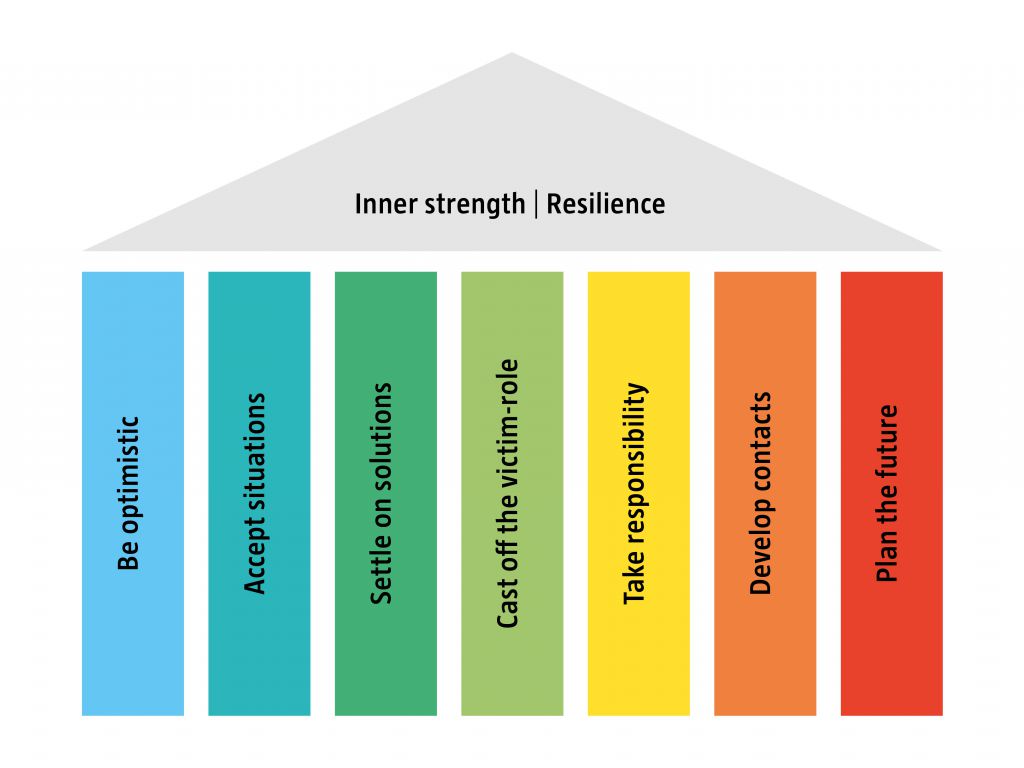“I must go through the crisis. Withstanding it rather than fleeing it. And sometimes, in the midst of the crisis, I even have to fight, lest I founder.” (Anselm Grün, 2002)
In the human experience, changes, upheavals, and crises are nothing new. Present in all of us is the ability to withstand difficult life situations without sustaining long-term damage. But the extent of this ability depends on various factors. One’s strength and flexibility can be trained and developed, superiors can lead in a way that builds resilience, and organisations themselves need to be culturally and structurally stable and agile in order to deal with present and future challenges. Moreover, resilience becomes even more central in times of increasingly frequent crises and drastic changes to our working and living environments, gaining in importance across all levels for every individual, for leaders and their teams, and for entire organisations.
Personal Resilience
The COVID crisis has affected and is relevant to all of us. Artists, however, have been hit maximally hard. And even so: Why do some people manage to prevail in difficult or even precarious times, showing themselves to be psychologically robust, while others are thrown completely for a loop? How does one, in times of extreme strain, “keep one’s head up”, “keep a stiff upper lip”, or “make the best of it”? Toughness, adaptability, and personal strategies for dealing with situations of (more or less intense) stress help us to pull through crises and regain our balance following setbacks.
The “seven pillars of resilience” pictured below sketch out the areas in which everyone can start honing these strategies on their own: Resilience arises as an outcome of reflecting on experiences of learning and coping. Being confident in one’s ability to independently master difficult life situations and one’s possession of problem-solving strategies that can be applied and adapted as one needs is referred to as “self-efficacy” or as an expectation of self-efficacy, and it contributes directly to the reduction of stress and thus to the preservation of one’s own health.
Workshops offered by the Human Resources Development Office – Center for Further Education and Fit2Work deal with specific aspects of inner strength and resilience and are open to all employees and students (titles translated; workshops in German):
- Problem-Solving Skills after Viktor Frankl, 26 January 2022
- The Basics of Handling Conflicts Intelligently, 8 April 2022
- Self-Confident without a Doubt – Trust in Yourself and in Your Own Abilities!, 1 June 2022
Organisational Resilience
In addition to individuals, it is especially necessary that organisations—in light of present-day social, economic, and ecological developments—react as flexibly as possible to changes in the environment (digital transformation, climate crisis) and adapt themselves to constantly changing conditions. In doing so, attention must be paid to striking a good balance between stability and elasticity when working toward goals.
9 factors that influence organisational resilience:
- A shared vision and a clear objective
- Understanding and influencing the surrounding environment
- Effective and encouraging leadership
- A resilience-promoting culture
- Information- and knowledge-sharing
- Resource availability
- Coordinated organisational areas (collaboration across departmental boundaries)
- The promotion of continual improvement
- The anticipation and management of change
Trust, common goals, and clear values unite and strengthen people in organisations as well as leaders who count on participation and multiperspectivity in order to provide orientation in times of great complexity and unpredictability.

A responsibly led organisation encourages a learning culture that focuses on autonomous learning and allows for mistakes. This makes possible further development, personal growth, and participation. A positive effect can be had here by actively pursued knowledge management that maintains and updates knowledge of processes and decision-making structures while also keeping this knowledge in circulation among an organisation’s employees—thereby easing organisation-wide collaboration and both smooth and effective interactions in the interest of achieving commonly held goals.
The close collegial exchange that, at the mdw, takes place within and between departments, research centres, dean’s offices, the organisational units of the University’s administration, the student body, the University leadership, others in leadership positions, and employees in general as well as with numerous colleagues from other institutions has, in our present crisis situation, contributed to the mdw’s situational elasticity. It was thus that, as the COVID crisis was beginning, the mdw clearly avoided descending into a shocked state of pandemic paralysis. Quite the contrary: by bundling its various resources, the mdw adapted quickly to the situation at hand—finding creative ways in which to sustain teaching, practicing, researching, testing, and administration.
Leadership in Resilient Organisations
People in leadership positions need to assume the central task of integrating those aspects that promote individual employee resilience and those that promote organisational resilience into everyday working life, cultivating them as a group. Furthermore, leaders need to work together with their entire teams to develop a lasting awareness of the reciprocal effects of attitude, behaviour, action, and environment.
Resilience represents an integral factor in future viability. And resilience also enables us to proceed in a mindful fashion in the here and now. It is thanks to resilience that we adapt more easily to new conditions, and it is with resilience that we can succeed in shaping our future in a forward-looking manner.
On this topic, see also:
Human Resources Development Office – Center for Further Education
(all courses below in German unless otherwise noted!)
mdw.ac.at/zfw/kurse
- Recognising Psychological Risks and Taking Action. My Role as a Leader in the Workplace, 22 October 2021
- Leadership in Processes of Change, 7 December 2021
- Understanding Conflicts for Leaders, 22 April 2022
Teambuilding Retreats: mdw.ac.at/zfw/klausurberatung
Lectures for Future: at.scientists4future.org/lectures
Sources:
http://mensch-im-wandel.de/cms/website.php?id=/de/index/beruflicheangebote/resilienz.htm (Last accessed: 22 July 2021).
https://juttaheller.de/elemente-organisationaler-resilienz (Last accessed: 23 July 2021).
Karsten Draht: Die resiliente Organisation – inkl. Arbeitshilfen online: Wie sich das Immunsystem von Unternehmen stärken lässt (Haufe Fachbuch). Bound edition, 9 October 2018.
Anselm Grün: Das Buch der Lebenskunst, S. 162, HERDER Spektrum Band 5700, 2016, ed. Anton Lichtenauer
Jutta Heller: 30 Minuten – Resilienz für Unternehmen, 2018.

